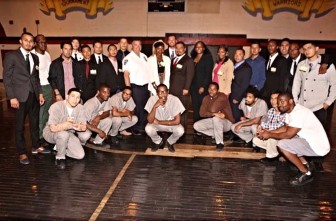 This summer I had the chance to visit Rikers Island in New York along with 15 other members of the Anti-Recidivism Coalition (ARC).
This summer I had the chance to visit Rikers Island in New York along with 15 other members of the Anti-Recidivism Coalition (ARC).
The trip was fortunate because a divine intervention occurred. What was supposed to have been just a tour quickly became our group being able to speak to all the incarcerated youth.
New York and North Carolina are the only two remaining states where all defendants 16 and older are automatically treated as adults in the criminal justice system. In other states, adult prosecution for youths 16 and up must be ordered by a judge.
An August report from the U.S. attorney for the Southern District of New York described a “deep-seated culture of violence”against adolescent inmates at Rikers Island.
The ARC is an organization of about 150 formerly incarcerated people now living productive lives. Part of its mission is to try to inspire the incarcerated to change their lives, while also being an ambassador for policy change in the juvenile and adult criminal justice systems.
We arrived in a black corrections van, suited and booted, wearing ties. After meeting the warden and a few other deputies we began our tour of the facility.
After five or 10 minutes, we passed a classroom of six teenagers, ages 16 and 17, studying life skills.

Alton Pitre
Alton Pitre along with 15 other members of the Anti-Recidivism Coalition (ARC) visit Rikers Island in New York.
We entered the classroom and talked to them. At first they were hesitant, probably wondering who we were invading their space, asking questions with nice suits on. A few of our members shared their stories, and eventually the youth opened up, sharing some of their stories.
After Winette Saunders, the lead deputy commissioner in charge of our tour, saw the students’ many, unexpected and positive reactions to our inspirational stories, she left to halt every nearby class in session, returning with about 60 more 16- and 17-year-olds.
She apologized for disrupting the informal meeting and urged us to repeat our testimonies, saying, “They need to hear this!” We continued sharing our stories and they did the same.
On the spur of the moment, Saunders then invited us to speak to the 18-year-olds at their housing facility across the street. We thought we would be walking into another small classroom with a few teens, but that was not the case.
We marched into a big basketball gymnasium with about 100 of the 18-year-olds waiting, seated on the bleachers. The staff had chairs lined up for us and were already setting up a microphone and speaker for our presentation.
As before, the inmates’ first reaction to us was dubious. Their faces were stern with disinterest and discomfort seeing all us strangers walk in dressed in professional clothing. They probably thought we were some high-ranked officials coming to talk to them about lord knows what.
I imagined they saw us as visitors in a zoo peeking at them like animals locked up in a cage. We pitched to them our usual stories, which reduced their reluctance to hear us out and eventually they were all ears.
When it was my turn, I told them of my false incarceration. Because I had been imprisoned facing a potential life sentence for a robbery I did not commit and was granted my freedom two years later, I stressed to them to always keep faith no matter their circumstances and that change starts while they are locked up and not back out on the streets.
An older male inmate also attended the session. He had been asked to leave his cell to help fix and set up the audio devices due to minor technical difficulties. He volunteered to speak, saying he was compelled to also give a testimonial.
He said he had been unaware of the miracle that awaited him in the gym and that it was God’s calling because he was enduring a time of depression but was revived by our powerful words. He also told the teens to change the direction of their lives before they are locked up at his age.
For the last 10 minutes, everyone interacted with each other. We did not want to only testify but to talk to them in regular conversation. So we left our seats and joined the 18-year-olds in the stands where we continued to chat on a more personal level.
Our trip to the notorious Rikers Island was life-changing not only for the youth, elder man and corrections staff but for myself as well.
To know that you can bring hope and incentive to a place that is prominently known for its brutal violence and inmates’ despair using words is truly and remarkably amazing. This visit solidified my passion of wanting to change and motivate the lives of the forgotten and condemned.
Alton Pitre is a 23-year-old native of Los Angeles. Overcoming the streets and incarceration as a youth, he now serves as an ambassador for juvenile justice. Pitre currently is studying sociology at Morehouse College in Atlanta.
Pingback: OP-ED: Our Words Break Down ‘Stern Disinterest’ of Incarcerated Youth | African in America Network